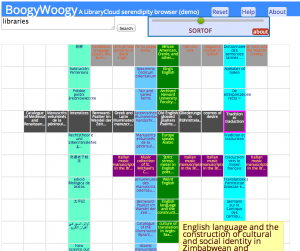October 13, 2014
Library as starting point
A new report on Ithaka S+R‘s annual survey of libraries suggests that library directors are committed to libraries being the starting place for their users’ research, but that the users are not in agreement. This calls into question the expenditures libraries make to achieve that goal. (Hat tip to Carl Straumsheim and Peter Suber.)
The question is good. My own opinion is that libraries should let Google do what it’s good at, while they focus on what they’re good at. And libraries are very good indeed at particular ways of discovery. The goal should be to get the mix right, not to make sure that libraries are the starting point for their communities’ research.
The Ithaka S+R survey found that “The vast majority of the academic library directors…continued to agree strongly with the statement: ‘It is strategically important that my library be seen by its users as the first place they go to discover scholarly content.'” But the survey showed that only about half think that that’s happening. This gap can be taken as room for improvement, or as a sign that the aspiration is wrongheaded.
The survey confirms that many libraries have responded to this by moving to a single-search-box strategy, mimicking Google. You just type in a couple of words about what you’re looking for and it searches across every type of item and every type of system for managing those items: images, archival files, books, maps, museum artifacts, faculty biographies, syllabi, databases, biological specimens… Just like Google. That’s the dream, anyway.
I am not sold on it. Roger cites Lorcan Dempsey, who is always worth listening to:
Lorcan Dempsey has been outspoken in emphasizing that much of “discovery happens elsewhere” relative to the academic library, and that libraries should assume a more “inside-out” posture in which they attempt to reveal more effectively their distinctive institutional assets.
Yes. There’s no reason to think that libraries are going to be as good at indexing diverse materials as Google et al. are. So, libraries should make it easier for the search engines to do their job. Library platforms can help. So can Schema.org as a way of enriching HTML pages about library items so that the search engines can easily recognize the library item metadata.
But assuming that libraries shouldn’t outsource all of their users’ searches, then what would best serve their communities? This is especially complicated since the survey reveals that preference for the library web site vs. the open Web varies based on just about everything: institution, discipline, role, experience, and whether you’re exploring something new or keeping up with your field. This leads Roger to provocatively ask:
While academic communities are understood as institutionally affiliated, what would it entail to think about the discovery needs of users throughout their lifecycle? And what would it mean to think about all the different search boxes and user login screens across publishes [sic] and platforms as somehow connected, rather than as now almost entirely fragmented? …Libraries might find that a less institutionally-driven approach to their discovery role would counterintuitively make their contributions more relevant.
I’m not sure I agree, in part because I’m not entirely sure what Roger is suggesting. If it’s that libraries should offer an experience that integrates all the sources scholars consult throughout the lifecycle of their projects or themselves, then, I’d be happy to see experiments, but I’m skeptical. Libraries generally have not shown themselves to be particularly adept at creating grand, innovative online user experiences. And why should they be? It’s a skill rarely exhibited anywhere on the Web.
If designing great Web experiences is not a traditional strength of research libraries, the networked expertise of their communities is. So is the library’s uncompromised commitment to serving its community’s interests. A discovery system that learns from its community can do something that Google cannot: it can find connections that the community has discerned, and it can return results that are particularly relevant to that community. (It can make those connections available to the search engines also.)
This is one of the principles behind the Stacklife project that came out of the Harvard Library Innovation Lab that until recently I co-directed. It’s one of the principles of the Harvard LibraryCloud platform that makes Stacklife possible. It’s one of the reasons I’ve been touting a technically dumb cross-library measure of usage. These are all straightforward ways to start to record and use information about the items the community has voted for with its library cards.
It is by far just the start. Anonymization and opt-in could provide rich sets of connections and patterns of usage. Imagine we could know what works librarians recommend in response to questions. Imagine if we knew which works were being clustered around which topics in lib guides and syllabi. (Support the Open Syllabus Project!) Imagine if we knew which books were being put on lists by faculty and students. Imagine if knew what books were on participating faculty members’ shelves. Imagine we could learn which works the community thinks are awesome. Imagine if we could do this across institutions so that communities could learn from one another. Imagine we could do this with data structures that support wildly messily linked sources, many of them within the library but many of them outside of it. (Support Linked Data!)
Let the Googles and Bings do what they do better than any sane person could have imagined twenty years ago. Let libraries do what they have been doing better than anyone else for centuries: supporting and learning from networked communities of scholars, librarians, and students who together are a profound source of wisdom and working insight.












